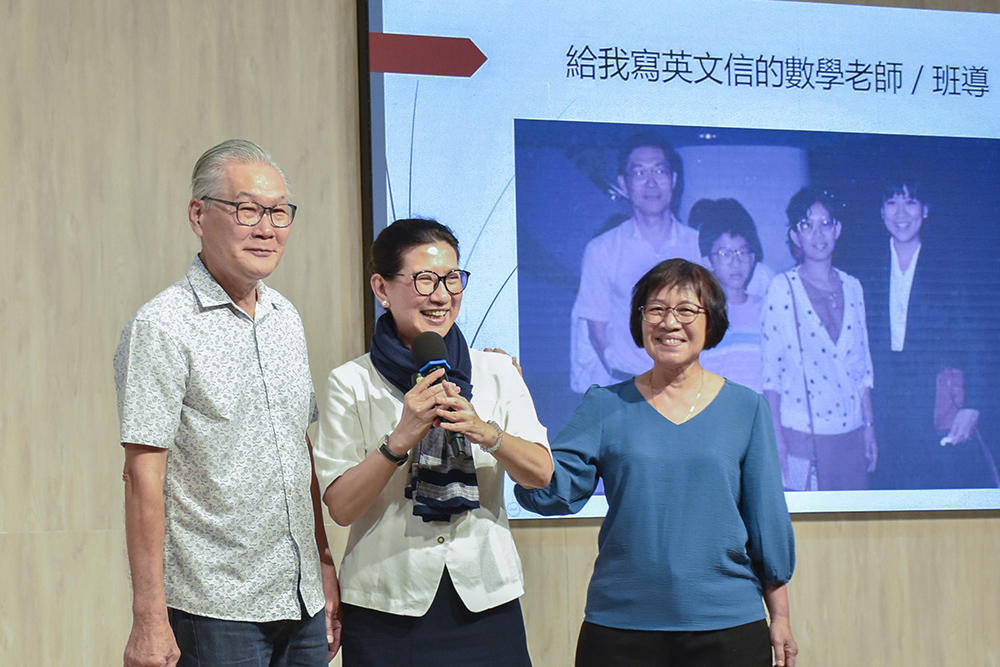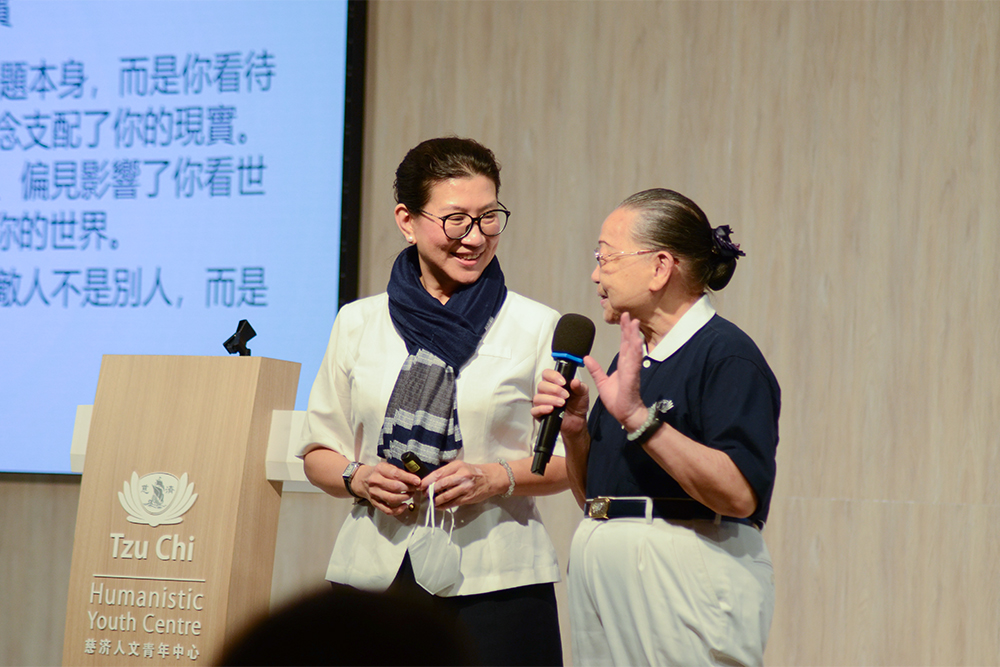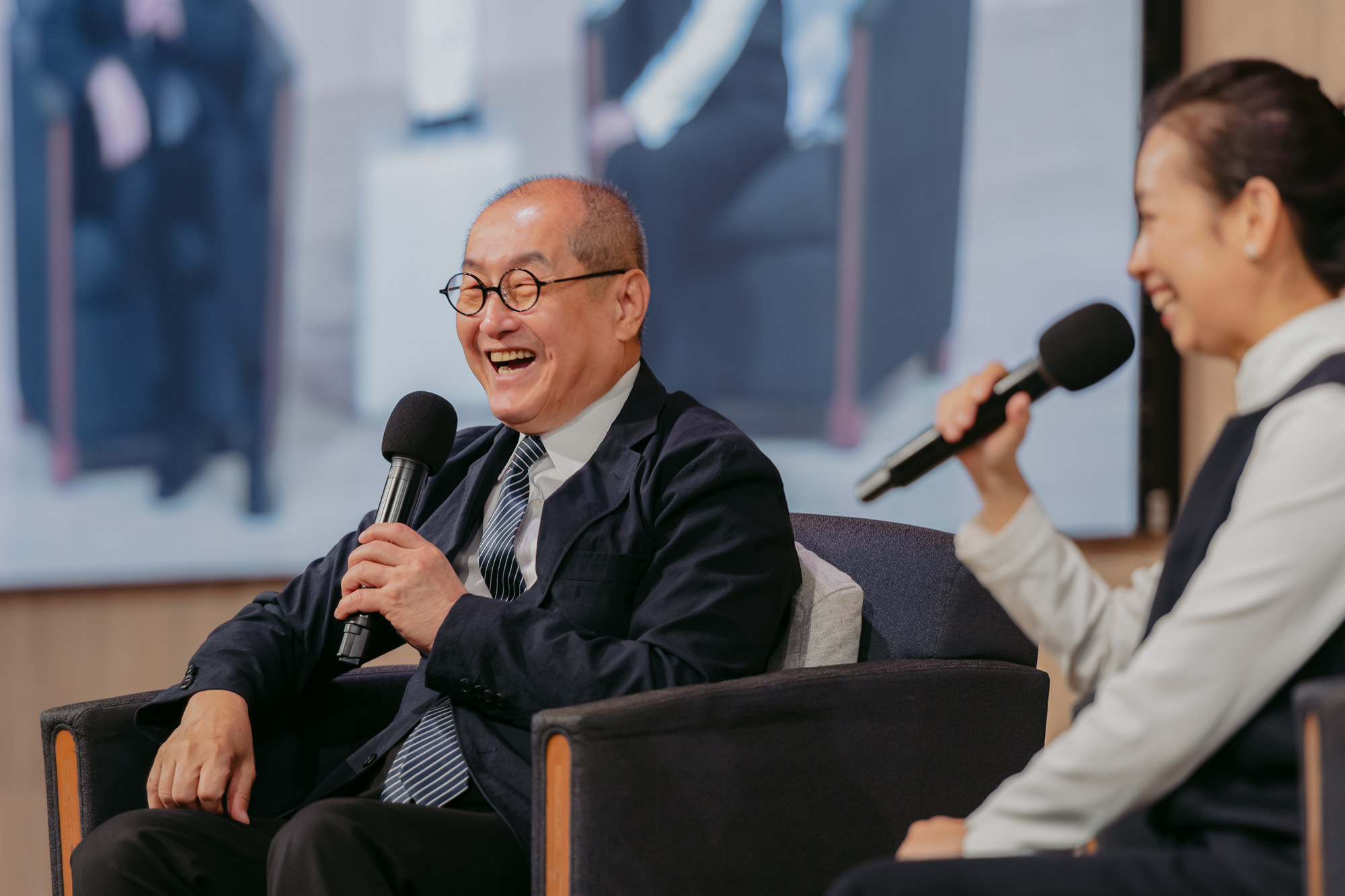On 3 July 2023, 300 people listened to Cheah Lee Hwa’s sharing at Tzu Chi Humanistic Youth Centre. (Photo by Chong Mong Zhuang)
How do you define happiness? When facing difficulties in life, have we ever noticed that the crux of the issue may not necessarily be the issue itself but our beliefs and mindset that dictate our perspectives on life? Therefore, how should we “decode” life for a journey towards greater happiness?
On 3 July 2023, 300 people gathered at Tzu Chi Humanistic Youth Centre for Ms Cheah Lee Hwa’s talk on “Decoding Happiness”. Ms Cheah is the Head of the Humanistic Culture Department at Tzu Chi University of Science and Technology in Taiwan. As it was their summer holidays, Ms Cheah led some teaching staff and students from the University on an overseas exchange trip, with Singapore being one of the countries visited. Ms Cheah leveraged examples of communication in everyone’s daily lives, allowing audience to glean their insights through her sharing.
Before the sharing started, students from Tzu Chi University of Science and Technology performed sign language and dances. However, when the students were getting ready on stage, there was a disruption to the audio-visual setup due to technical issues, causing a wave of uneasiness in the audience.
In the face of an unforeseen situation, Ms Cheah quipped, “As seniors, we should remain composed when facing issues like this so that the children can calm themselves down and take things in their stride. This situation is precisely the preparation we need for the sharing later!” Thankfully, the difficulties were quickly resolved, and the talk could commence as planned.
Students from Tzu Chi University of Science and Technology enthusiastically performing sign language and dances for the audience. (Photo by Tan Sam Ba)
Passing on experiences and paying the love forward
Ms Cheah is from Penang, Malaysia, and she used to be a lawyer. After that, she had the opportunity to learn about Tzu Chi and met Master Cheng Yen in Hualien, Taiwan. Inspired by the charitable work that Tzu Chi does, she decided to devote herself to the education industry. After her stint as a principal at Han Chiang Independent High School, she is now Head of the Humanistic Culture Department at Taiwan’s Tzu Chi University of Science and Technology. In her daily work, she meets many young learners, enabling her to glean many insights into education.
She vividly recalled when she was in primary one, her principal would treat students as if they were his children, showering them with love in educating them. When the principal retired, he gave each student a huamei (a type of preserved plum) as he wanted to convey the meaning of “pleasure comes through toil”.
As an educator herself now, she also hopes to convey such love and care for her students. She also gives graduating students a huamei, conveying her best wishes for students to be able to reap sweet joys after working hard.
During her time in secondary school, her mathematics teacher doubled up as her first teacher to initiate her into English. When teaching mathematics, her teacher would encourage students to write to each other in English to improve their English competency. She built strong teacher-student ties with her mathematics tutor and remained in close contact with him even after becoming an educator. Up till today, she uses the same mindset in guiding her students to excel.
Ms Cheah further shared how replicating such experiences made her realise that love can be passed on from educators to students. At this point in the sharing, she invited her mathematics teacher on stage to introduce himself to the audience. As she led her mathematics teacher and form teacher on stage, thunderous applause came from the audience. This is the embodiment of how education can have long-lasting impacts, passing love from educators to students.

Ms Cheah announced that her teachers were also in the audience and led them on stage to introduce them to the audience. (Photo by Chong Mong Zhuang)
Loving all her students the same despite approaching each one differently
Ms Cheah once asked her students: "Who do you all think my favourite student is?"
The students couldn't answer her. Ms Cheah then responded with a smile: "I treat every student with the same amount of love, but I use different ways to engage each of them."
She then continued: "Master Cheng Yen once said that only when the teacher imparts wisdom and love to the students without any reservation will the students always remember the teacher's love, thereby inspiring the student's intuitive ability to tell right from wrong, hence benefiting other living beings."
Ms Cheah inspired the audience by giving an example of splitting apples equally. She raised a question: When eleven people intend to divide ten apples equally, how should the apples be distributed?
Ms Cheah said that intellectuals may focus on the numbers and may even insist on distributing the apples based on their sizes for equality. However, people with wisdom will tend to consider who needs it more and distribute more shares to them instead.
She continued to introduce Tzu Chi's education philosophy which emphasises on the grooming of "talents with high wisdom", as the focus is not only on imparting knowledge but also on shaping students' character by nurturing wisdom in them. She pointed out that if there is only knowledge without wisdom, people tend to fight with others for their personal interests.
Ms Cheah firmly believes that students learn by observing the teacher's behaviour. So, with such belief, she will always lead by example when handling matters. Therefore, she often emphasizes the importance of prioritizing character building and the cultivation of virtue in education.
(Photo by Tan Sam Ba)
Our faith will decide our destiny
Although Ms Cheah is a very experienced teacher, she sometimes encounters issues getting along with some teachers and students. She candidly shared a situation where a student once complained about her.
Ms Cheah said: "During a lesson, I called out a student's name 12 times and, in the end, I got complained. So, should I continue to call his name after his complaint?"
This question raised many different views and discussions among the audiences.
She smiled and continued: "In a situation like this, we must learn to observe and discern what others think from his body language."
In the end, Ms Cheah apologised and reconciled with the student and moved on with her usual teaching style and how she interacts with her students.
"Don't feel wronged for being apologetic, and it is, in fact, a brave act."
Ms Cheah further explained that many problems often begin from people's dissatisfaction or dislike for others, which is the so-called "eyesore". Problems arise when other people's expectations and feelings differ from our own.
In such cases, personal perceptions or biases are invoked, but this is based on the individual's subjective view of the matter and not the facts of the matter. Therefore, in order to dissolve the differences in interpretation and understanding of the matter, we need to dispel all prejudices and distinguish clearly whether it is a matter of "fact" or "feeling"?
Ms Cheah reminded everyone not to mistake other people's feelings for facts and mistakenly think that others are refuting us, as this will quickly lead to conflicts. The root of resolving problems lies in expressing one's own opinion clearly and accurately while at the same time trying to understand others' points of view.
Two questions appeared on the big screen, which Ms Cheah encouraged everyone to reflect on: "Whose problem is this?" "Who needs to be pleased?"
She emphasised: "When we don't understand the behaviour of the other party, we should ask more questions."
She pointed out that the needs of our subconscious mind are often hidden behind every dispute. But when we know exactly what we want to express when we encounter problems, we can reach a settlement, and the dispute will gradually dissipate.
The wisdom of woodpeckers
Ms Cheah compared educators to woodpeckers. She believes that education is like sculpting students to lead them to a bright future. Educators should stay rooted in the essence of education and comply with their predestined career in the education sector, and they will then obtain the best-desired results.
Ms Cheah believes that every student should be given the opportunity to develop their speciality. Otherwise, if all the time is used to make up for their weaknesses, not only would it not fix their shortcomings, but their strengths may also degenerate. Hence, the students will lose their self-confidence.
From an educator's point of view, Ms Cheah led everyone in the audience to ponder over the core theme of this talk, which is how one defines a happy life. Her answer: "Our world is created by our mind, so as long as we can change our perspective in looking at things, the world around us will also change accordingly."
 Cheah Lee Hwa invites a senior Tzu Chi volunteer (Sister Yi De) who has been caring for the Tzu Chi’s youth for more than ten years to come on stage and share her experience. Despite suffering from illnesses, she still persevered in accompanying and caring for the youths. (Photo by Tan Sam Ba)
Cheah Lee Hwa invites a senior Tzu Chi volunteer (Sister Yi De) who has been caring for the Tzu Chi’s youth for more than ten years to come on stage and share her experience. Despite suffering from illnesses, she still persevered in accompanying and caring for the youths. (Photo by Tan Sam Ba)

